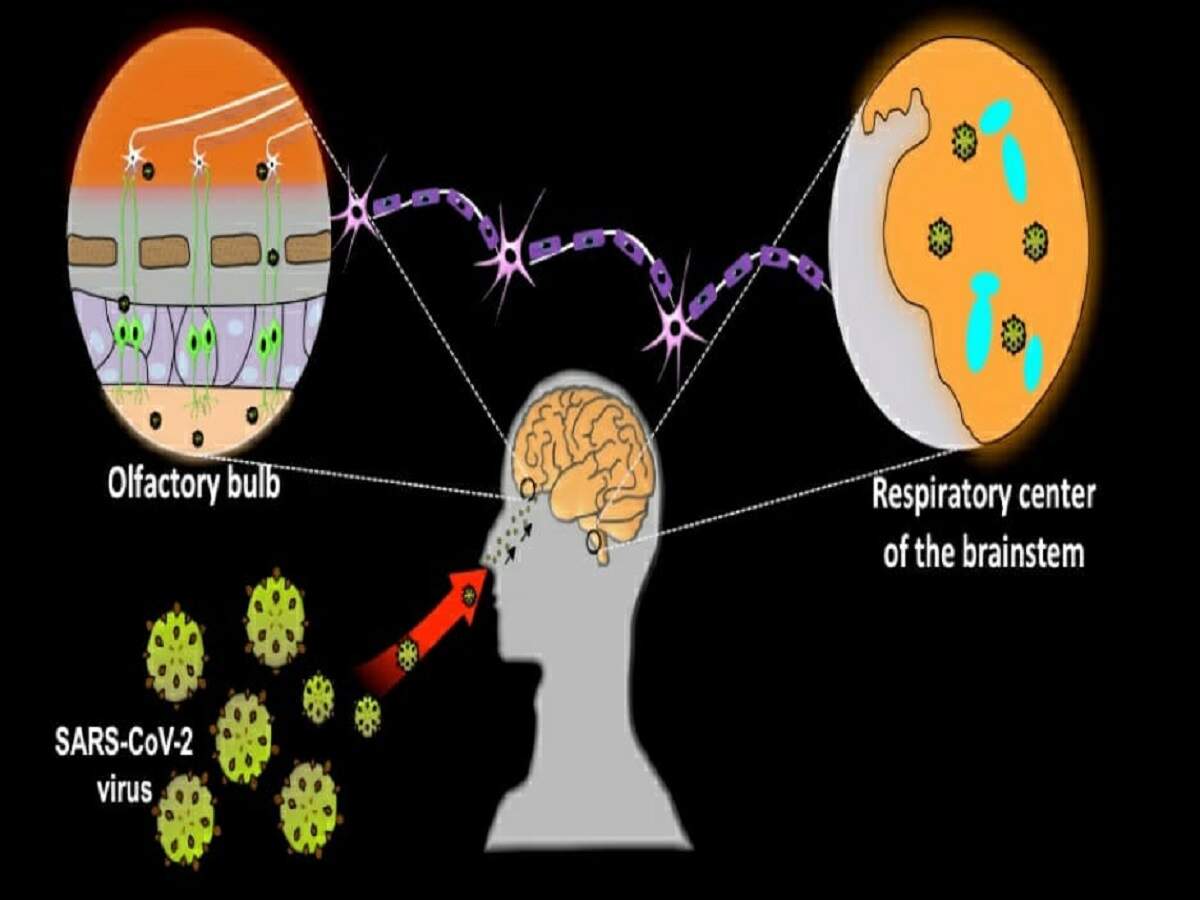Top Searches
- News
- India News
- Covid-19 may infect respiratory centre of brain
Covid-19 may infect respiratory centre of brain

Representative image/Credit: PTI File Photo
BENGALURU: Researchers from the Indian Institute of Chemical Biology (IICB), who have explored the neuro-invasive potential of SARS-CoV-2, have suggested that the virus may infect the respiratory centre of the brain. They say that attention should be focused on the respiratory centre of the central nervous system to search for mortality due to Covid-19.
The paper published in ACS Chemical Neuroscience and supported by Science and Engineering Research Board (SERB) under the Department of Science and Technology (DST), implies that SARS-CoV-2 virus might enter the human brain through the nose and reach the olfactory bulb of the brain.
“From there, SARS-CoV-2 virus might infect PreBötzinger complex (PBC), the primary center of the brain that controls the respiratory rhythm generation. This explains that collapse of the respiratory center in the brain may be responsible for breakdown of Covid-19 patients,” DST said.

The team of researchers — Prem Tripathi, Upasana Ray, Amit Srivastava and Sonu Gandhi — has argued that although lung is one of the most infected organs, several other organs, including the brain, are also affected.
The scientists suggest that cerebrospinal fluid of Covid-19 patients and the postmortem brain of deceased patients should be assessed to better understand the route of SARS-CoV-2 entry and its spread to the respiratory centre of the brain.
“PreBötzinger complex functions as the primary respiratory oscillator and it has been proposed as a center of respiration. It has been earlier shown that disruption of PBC causes lethality due to respiratory failure, suggesting its central role in respiratory rhythm generation,” the DST added.
It is possible that SARS-CoV-2 may shut down respiratory centres, and in turn breathing by infecting and destroying the PBC of the brainstem.
“Although this underline hypothesis needs to be validated for SARS-CoV-2, another recent study from a group of scientists at King’s College London, UK highlighting loss of smell was one of main symptoms of Covid-19 patients, hints at the involvement of the same route through which SARS-CoV-2 may enter the brain,” the researchers have said.
SARS-CoV-2 and SARS-CoV not only share high levels of DNA sequence similarity, both of them exploit the same angiotensin-converting enzyme 2 (ACE2) receptor, through which the virus enters in target cells. Due to this, it was anticipated that the mechanism through which SARS-CoV infected the host cell could also be the same for SARS-CoV-2, they further argued.
The study highlights that it is important to not only screen Covid-19 patients for neurological symptoms but also further segregate when the symptom appears.
The paper published in ACS Chemical Neuroscience and supported by Science and Engineering Research Board (SERB) under the Department of Science and Technology (DST), implies that SARS-CoV-2 virus might enter the human brain through the nose and reach the olfactory bulb of the brain.
“From there, SARS-CoV-2 virus might infect PreBötzinger complex (PBC), the primary center of the brain that controls the respiratory rhythm generation. This explains that collapse of the respiratory center in the brain may be responsible for breakdown of Covid-19 patients,” DST said.

The team of researchers — Prem Tripathi, Upasana Ray, Amit Srivastava and Sonu Gandhi — has argued that although lung is one of the most infected organs, several other organs, including the brain, are also affected.
The scientists suggest that cerebrospinal fluid of Covid-19 patients and the postmortem brain of deceased patients should be assessed to better understand the route of SARS-CoV-2 entry and its spread to the respiratory centre of the brain.
“PreBötzinger complex functions as the primary respiratory oscillator and it has been proposed as a center of respiration. It has been earlier shown that disruption of PBC causes lethality due to respiratory failure, suggesting its central role in respiratory rhythm generation,” the DST added.
It is possible that SARS-CoV-2 may shut down respiratory centres, and in turn breathing by infecting and destroying the PBC of the brainstem.
“Although this underline hypothesis needs to be validated for SARS-CoV-2, another recent study from a group of scientists at King’s College London, UK highlighting loss of smell was one of main symptoms of Covid-19 patients, hints at the involvement of the same route through which SARS-CoV-2 may enter the brain,” the researchers have said.
SARS-CoV-2 and SARS-CoV not only share high levels of DNA sequence similarity, both of them exploit the same angiotensin-converting enzyme 2 (ACE2) receptor, through which the virus enters in target cells. Due to this, it was anticipated that the mechanism through which SARS-CoV infected the host cell could also be the same for SARS-CoV-2, they further argued.
The study highlights that it is important to not only screen Covid-19 patients for neurological symptoms but also further segregate when the symptom appears.
FacebookTwitterLinkedinMail
Start a Conversation
end of article
Trending Topics
Quick Links
Coronavirus in MumbaiCoronavirus in KolkataCoronavirus in HyderabadCoronavirus in DelhiCoronavirus in BangaloreCoronavirus symptomsCoronavirus in IndiaWhat is CoronavirusCoronavirus NewsSolar EclipseNPRWhat is NRCCAB BillCAB and NRCRTI BillPodcast newsLok SabhaShiv SenaYSRCPCongressBJP newsUIDAIIndian ArmyISRO newsSupreme Court